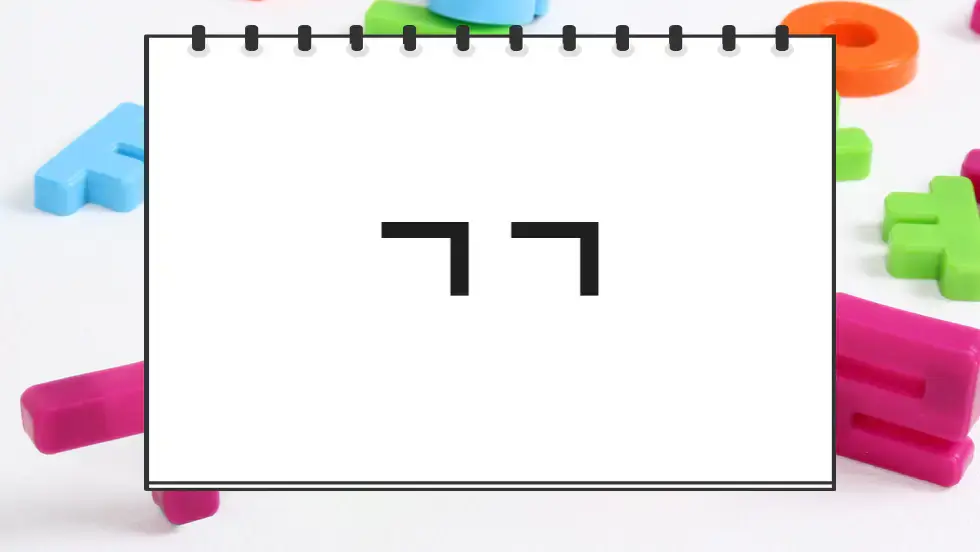💎 What you'll learn in this post
📌 Heads up before you read
When you start chatting with Koreans, you’ll come across shortened expressions made up of just one consonant almost every day.
The closer you get to younger Koreans, the more essential these expressions become. 💬 If you’re into gaming, you’ll often see them pop up in in-game chats, so be sure to remember them. 🎮
Learning these will not only make your conversations feel more natural but also help you understand their meanings and nuances. Trust us, you’ll want to know them.
💬 Real Korean Expressions in Conversation
Here’s an example of an actual KakaoTalk chat between two Koreans on October 30, 2024:

If you look at the conversation, it’s clear they’re making dinner plans, but figuring out exactly what they’re saying in between might not have been so easy, right? 😊

ㅊㅋㅊㅋ
ㅊㅋ means 축하[chu-ka] (Congratulations), mimicking the casual pronunciation 추카[chu-ka]. For this reason, it’s sometimes written as 추카[chu-ka]. This abbreviation is often used to celebrate or congratulate someone in a light and friendly way. 🎉

ㅇㅇ
ㅇㅇ, a commonly used Korean chat expression, is a shortened version of 응 [eung], which means ⭕ Yes. It’s often used to show agreement, acceptance, or approval of someone’s suggestion. While it’s usually written as ㅇㅇ, Koreans in a hurry or those who prefer shorter texts might opt for just a single ㅇ. Quick, simple, and super effective.

ㄳ, ㄱㅅ
ㄱㅅ is a commonly used abbreviation for 감사[gam-sa] (thank you), making expressions such as 감사합니다[gam-sa-hap-ni-da] (thank you) or 고맙습니다[go-map-sseum-mi-da] (thank you) much shorter. 🙏 It’s often simplified further into just ㄳ or ㄱㅅ, making it quick and easy to use in casual chats. Simple, yet polite.

ㄴㄴ
ㄴㄴ is short for 노노[no-no] and is widely used in casual conversations. It means ❌ no, ❌ none, ❌ can’t, or ❌ don’t want to, depending on the context. ㄴㄴ is often used to soften rejection, making it feel lighter and more pleasant, especially in situations where saying "no" outright might seem too harsh or rigid.
For example, if you’d rather stay home but a friend invites you out, instead of firmly refusing, you can lightly decline by saying ㄴㄴ. This keeps the tone friendly while still expressing your feelings. 😊

ㅇㅋㅇㅋ
ㅇㅋ stands for 오케[o-ke], which is a shortened form of 오케이 (Okay). For simplicity, many people write 오케[o-ke] instead of the full 오케이 (Okay). When you’re enthusiastically agreeing with someone’s suggestion, ㅇㅋ is often repeated, as in ㅇㅋㅇㅋ or 오케오케[o-ke-o-ke]. It’s a friendly way to show strong agreement, so it’s helpful to remember this usage for more casual and positive conversations. 😊

ㄱㄱ
This is a very exciting expression. ㄱㄱ is an abbreviation of 고고 (Go Go), commonly used by Koreans to encourage or push for an action. It’s similar to saying "Let's go!" or "Let's do it!" in English, conveying a light and positive vibe. 😊
🖐 !!!!!, ㅎㅎ and ㅠㅠ have already been covered in another post, so we’ll skip it here. If you’re curious, check out the Related Posts below.

ㅈㅅ
ㅈㅅ is an abbreviation for 죄송[joe-song] (Sorry) and is commonly used to express an apology in a light and casual way. This abbreviation is widely used in everyday life by people of all ages, making it a versatile and friendly way to say 🙏 Sorry.
Not difficult at all, right?
The expressions you’ll learn going forward, or have already learned, are communication styles commonly used in chats, relying only on the initials of words.
🚨 The expressions covered today are very casual and should be used with close friends, peers, younger siblings, or family members you’re comfortable with. Avoid using them with someone you’re not close to yet!
🎁 Now, Let’s Practice 🎁
Here’s a real example of a conversation between two Koreans, translated into English. Take a look and try to understand the flow!
🖐️ If you have any questions, feel free to leave a comment below or DM us on KONOGRAM's Instagram, X, or Facebook!


The post we shared today is super practical, so make sure you try it out. 💪🏼
Did you enjoy this post?
Your click on the ad below would mean a lot to us!
Each click helps support the creation of even better content.
Comments